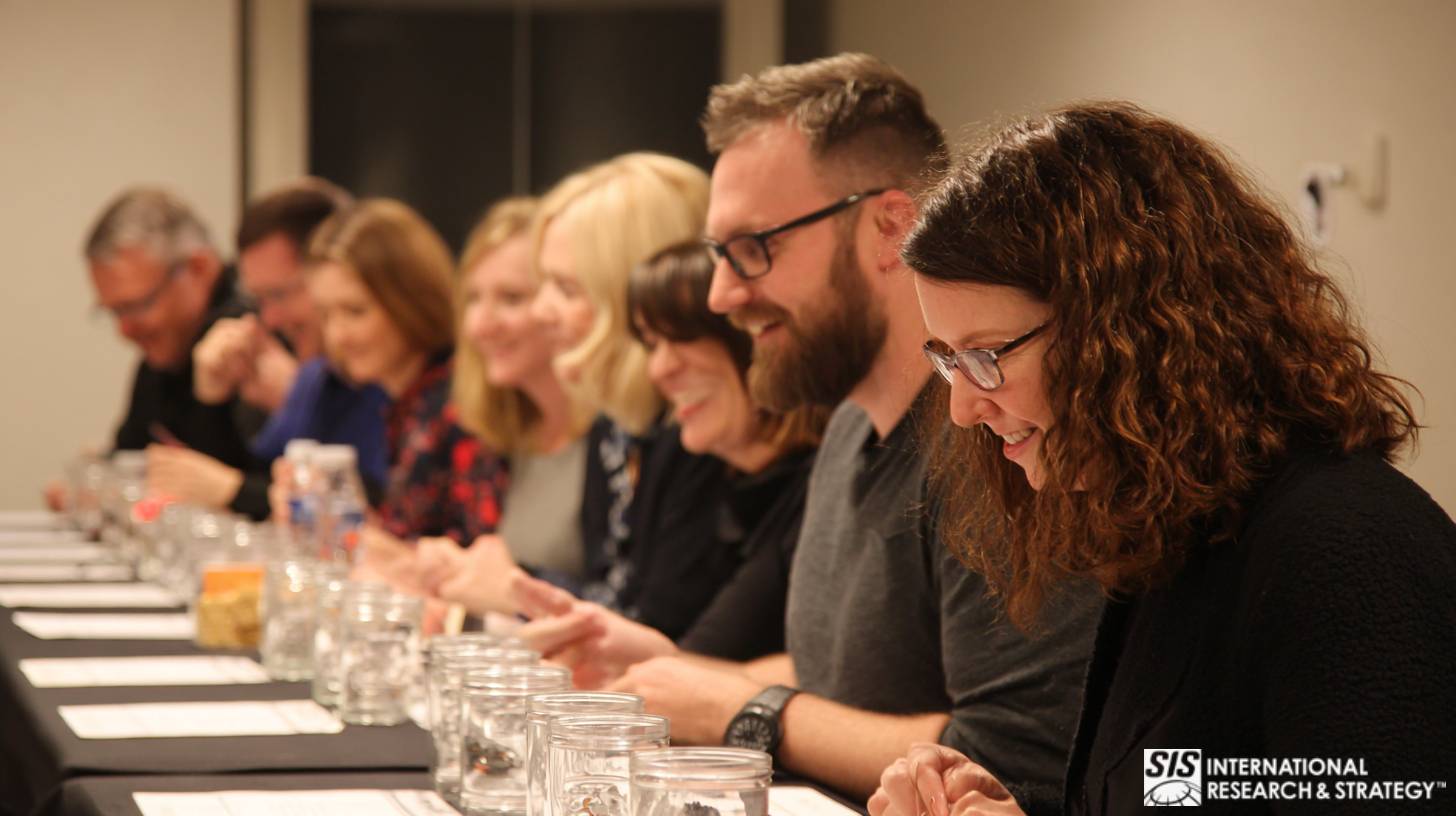味觉测试验证市场研究

In the highly competitive food and beverage development industry, how can businesses ensure the accuracy and reliability of their taste testing results? Taste testing validation market research is the answer.
As consumers become more aware of different brands, reliable data is crucial to ensure that the taste resonates consistently with target audiences. Thus, taste testing validation market research emerges as a cornerstone, providing businesses with the confidence that their product decisions are rooted in valid and trustworthy insights.
电视able of Contents
了解味觉测试验证
Taste testing validation market research revolves around ensuring that the methods and results of taste tests are reliable and accurate. Validation is the process of confirming that taste tests measure precisely what they intend to.
Its rigorous focus on control, standardization, and verification distinguishes itself from regular taste tests. Taste testing validation market research goes beyond collecting feedback and dives deeper into ensuring that external factors, biases, or unforeseen influences do not skew the results.
为什么味觉测试验证很重要?

The food and beverage sector demands a heightened level of precision – and that’s why 味觉测试验证市场研究 plays an indispensable role in meeting regulatory standards and enhancing product quality… But, why is its importance so pronounced?
- 结果的可靠性: Taste tests without validation might offer insights, but how specific can a business be of its repeatability? Market research ensures that a product’s reception isn’t just a one-time phenomenon but can be replicated with similar audiences and settings.
- 数据驱动的决策: In an industry where margins can be thin, making informed decisions is paramount. The robustness of taste testing validation market 研究 allows businesses to confidently move forward, knowing their strategies are rooted in reliable data.
- 可信度: For stakeholders (investors, partners, or even consumers), knowing that a product has undergone rigorous taste testing validation enhances trust. It clearly conveys that the business values accuracy and is committed to delivering consistent quality.
- 成本效益: Mistakes in the food and beverage sector can be costly. Launching a product based on flawed data can result in significant losses.
Taste Testing Validation: Reliability Metrics & Quality Assurance Standards
| Validation Metric / Standard | Required Value / Benchmark | 来源 |
|---|---|---|
| Test-Retest Reliability Coefficients | ||
| Test-retest correlation for taste recognition thresholds (general) | Good repeatability across measurements | PMC – Taste Recognition Study |
| Test-retest reliability for TASTE questionnaire domains | 0.55 to 0.86 (good across all domains) | PMC – TASTE Tool Validation |
| Pleasantness ratings correlation (high sugar concentrations) | 0.18 to 0.71 (11 of 20 statistically significant) | PMC – Taste Perception Reliability |
| Large magnitude correlation coefficient threshold | ≥0.50 for adequate reliability | PMC – Correlation Standards |
| Internal Consistency & Validity | ||
| Cronbach’s alpha for excellent consistency | >0.8 (excellent); >0.7 (acceptable) | PMC – Psychometric Validation |
| TASTE questionnaire Cronbach α range | 0.65 to 0.86 across domains | PMC – TASTE Tool Development |
| Correlation with sensory function tests (criterion validity) | Satisfactory with Sniffin’ Sticks & Taste Sprays | PMC – Criterion Validity Assessment |
| Sensory Profiling Replication | ||
| Correlation coefficient between replicate evaluations | >0.9 for 85% of significant attributes | ScienceDirect – Sensory Profiling Study |
| MANOVA product discrimination significance (1 vs 2 replicates) | Identical for 97% of datasets | ScienceDirect – Replication Analysis |
| Optimal number of replicates for sensory profiling | ~4 replicates; 2-3 typical for routine work | ScienceDirect – Replication Guidelines |
| Clinical Test Sensitivity & Specificity | ||
| Seven-iTT cut-off criterion for dysfunction (6 of 7 correct) | 84.3% sensitivity; 51.0% specificity | PMC – Seven-iTT Clinical Test |
| Cohen’s kappa agreement (fair agreement threshold) | κ = 0.25 (fair agreement) | PMC – Statistical Agreement |
| ISO International Standards | ||
| Sensory assessor selection and training standard | ISO 8586:2023 | ANSI Standards Blog |
| General methodology guidance for sensory analysis | ISO 6658:2017 | ISO Standards Catalog |
| Establishing sensory profile methodology | ISO 13299:2016 | ISO Standards Catalog |
| Quality control application guidance | ISO 20613:2019 | ISO Standards Catalog |
| Laboratory accreditation requirements | ISO/IEC 17025:2017 | Food Science & Technology |
| Sensory claim substantiation guidance | ISO 20784:2021 | Food Science & Technology |
| ASTM Testing Standards | ||
| Triangle test standard method | ASTM E1885-25 | ASTM Standards Store |
| Same-Different test method | ASTM E2139-25 | ASTM Standards Store |
| Tetrad test method | ASTM E3009-24 | ASTM Standards Store |
| Paired preference test | ASTM E2263-25 | ASTM Standards Store |
| Sensory claim substantiation guide | ASTM E1958-25 | ASTM Standards Store |
| Panel Performance Indicators | ||
| Panel performance criteria | Discriminability, repeatability, agreement, consistency | Academia – Panel Performance Review |
| Repeatability & reproducibility indices (desirable values) | Small values preferred for R&R indices | ScienceDirect – ANOVA Analysis |
| European accreditation guidance document | EA-4/09 G:2017 (updated to align with ISO 17025:2017) | Food Science & Technology |
| Quality Control Methods | ||
| In-out test for production conformance | Determines if sample meets specifications | E3Sensory Guidelines |
| Difference from control test | Indicates magnitude of difference from standard | E3Sensory Guidelines |
| Descriptive analysis for quality control | Provides intensity scores for sensory attributes | ISO 20613:2019 |
| Validation Applications | ||
| Olive oil extra virgin quality validation | Chemical composition + sensory characteristics required | Sirocco Consulting Case Study |
| IOC sensory methodology | Single attributes with intensity scales for rating | Sirocco Consulting Case Study |
| Panel screening for olive oil (taste threshold evaluation) | 13 aqueous solutions of 5 basic tastes tested | Sirocco Consulting Case Study |
| Training duration for bread sensory panel | 4 months with one training session per week | Sirocco Consulting Case Study |
采用味觉测试验证市场研究的企业的益处
由于口味和风味的主观性,企业在确保产品的相关性和吸引力的同时,不断面临创新的压力。这就是味觉测试验证市场研究成为游戏规则改变者的地方。以下是企业通过采用这种严格的研究方法可以获得的显著好处:
- 增强产品发布的信心: With data from taste testing validation market research, businesses can launch new products or tweak existing ones with greater confidence, knowing they’re grounded in verified consumer preferences.
- 数据驱动创新: In an era where data is king, having reliable, validated insights enables businesses to drive innovation that is not just creative but also aligned with actual consumer preferences.
- 优化营销策略: 了解产品的风味特征是否经过验证,可以为营销团队提供坚实的基础。他们可以制定引人注目的营销策略,根据可靠的口味测试验证市场研究,将产品定位为真正满足消费者需求的产品。
- 增强品牌声誉: 持续提供能引起消费者共鸣的产品可提高品牌可信度。当消费者知道品牌产品有经过验证的研究支持时,信任度和忠诚度就会增加。
- 降低商业风险: 进入新的风味领域或调整既有风味领域本身就存在风险。味觉测试验证市场研究有助于降低这些风险,确保业务决策基于可靠数据。
- 定制产品供应: Different markets might have varied taste preferences. Through validated research, businesses can tailor their offerings to regional or demographic-specific tastes, thereby ensuring broader appeal.
机会
As consumer preferences continue to evolve, businesses in the food and beverage industry must adapt to meet these dynamic needs. By leveraging taste testing validation market research, companies can uncover several untapped opportunities:
- 进入新市场: 拓展新的人口或地理市场是一项挑战。然而,通过市场研究,企业可以深入了解当地口味偏好,从而相应地调整产品,确保成功进入市场。
- 产品线扩展: Existing products can be innovated by introducing new flavors or variants. Validated taste tests can identify which potential extensions will resonate most with target consumers.
- 个性化的消费者体验: With the rise of personalized nutrition and diets, there’s an opportunity to use 味觉测试验证市场研究 to develop products tailored to niche consumer segments, catering to specific taste preferences or dietary needs.
- 通过透明度实现参与: Modern consumers value transparency. Businesses can showcase their commitment to delivering truly consumer-centric products by sharing insights and results from their validated taste tests, enhancing brand trust.
- 可持续性和道德偏好: 越来越多的消费者会根据可持续性和道德生产做出选择。企业可以通过口味测试来验证环保或道德采购原料的可接受性,以确保它们符合消费者的口味期望。
- 协作创新: 与厨师、食品科学家和营养学家合作开发独特且有吸引力的产品。市场研究可以为这些合作创新提供反馈,确保它们符合消费者的口味。
- Packaging and Presentation Feedback: While the primary focus is on taste, how a product is presented can influence perception. Businesses can validate the taste and overall experience – including packaging and presentation – ensuring a holistic positive response.
- 及时适应: Regular market research can identify shifts in consumer preferences early, enabling businesses to adapt swiftly.
企业市场研究中味觉测试验证的挑战
While taste testing validation market research offers many benefits and insights, it’s not without its challenges. Businesses seeking to harness their power must navigate several hurdles such as:
- 品味的主观性: 每个人的口味都是独一无二的,因此很难将结果标准化。一个人觉得美味的食物,另一个人可能会觉得难吃。汇总这些不同的反应以得出有意义的见解对市场研究人员来说可能具有挑战性。
- 招募合适参与者: 确保样本的多样性和代表性至关重要。找到能够反映目标市场人口统计和偏好的合适参与者组合可能非常耗费资源。
- 文化差异: 随着企业在全球扩张,了解和考虑口味偏好的文化差异变得至关重要。然而,跨文化标准化口味测试具有挑战性。
- 技术整合: While technology can enhance 味觉测试验证市场研究, integrating the latest tools and platforms requires expertise and can pose challenges regarding training and adaptability.
Taste Testing & Sensory Analysis Market Growth Projections
Global market value projections showing compound annual growth rates (CAGR) across multiple market segments through 2033
What Makes SIS International a Top Taste Testing Validation Market Research Company?
SIS 国际 is a trusted leader in taste testing validation, offering businesses precise and reliable insights to ensure their products align with consumer expectations. With over 40 years of 市场研究经验, state-of-the-art methodologies, and a focus on actionable results, SIS helps brands succeed in competitive industries.
Expertise in Taste Testing Validation
Taste testing validation requires a deep understanding of consumer preferences and advanced research techniques. SIS excels in this field, using proven methodologies to confirm product quality, consistency, and appeal, ensuring your products meet market standards.
State-of-the-Art Research Facilities
Our New York-based facilities have cutting-edge sensory analysis tools and controlled environments. These resources enable SIS to conduct precise evaluations, ensuring that your products are validated with the utmost accuracy.
Diverse Consumer Panels for Broader Insights
New York’s diverse population allows SIS to recruit participants from varied backgrounds, lifestyles, and demographics. This ensures our taste testing validation reflects the preferences of a wide and representative consumer base.
定制测试解决方案
Every product and brand is unique, and SIS customizes its validation processes to align with your goals. Whether testing new recipes, reformulated products, or variations across markets, we design our studies to deliver insights that meet your needs.
Over 40 Years of Market Leadership
SIS has been a pioneer in market research for decades. Our extensive experience ensures that industry expertise, rigorous processes, and proven methodologies back your taste testing validation.
Affordable, High-Quality Research Services
We offer premium taste testing validation at competitive rates, providing exceptional value to businesses of all sizes. SIS ensures that world-class research is accessible without compromising quality or results.
Rapid and Efficient Turnaround Times
In fast-moving industries, timely insights are critical. SIS delivers results quickly, enabling you to make data-driven decisions and adjust strategies without delays.
Insights That Drive Product Excellence
SIS doesn’t just validate your products—we provide actionable recommendations. Our insights help you refine flavors, improve consistency, and enhance overall appeal to ensure your products meet and exceed consumer expectations.
Commitment to Objective Research
Taste testing validation demands impartiality, and SIS is dedicated to providing unbiased results. Our methodologies focus purely on consumer perceptions, ensuring accurate and trustworthy findings.
A Strategic Partner for Long-Term Success
SIS goes beyond research execution by collaborating with clients to ensure their success. From project planning to detailed reporting and recommendations, we act as a strategic partner invested in your product’s success.
我们的纽约工厂地址
纽约州纽约市东22街11号2楼 10010 电话:+1(212) 505-6805
关于 SIS 国际
SIS 国际 提供定量、定性和战略研究。我们提供决策所需的数据、工具、战略、报告和见解。我们还进行访谈、调查、焦点小组和其他市场研究方法和途径。 联系我们 为您的下一个市场研究项目提供帮助。
